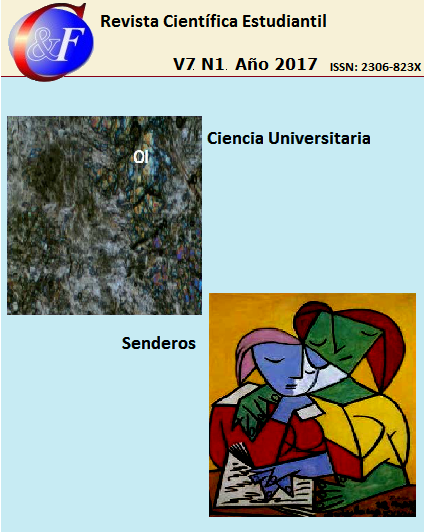Environmental strategy for the national geoscience training program of the Instituto Universitario Tecnológico de Maracaibo, Venezuela
Keywords:
strategy, environmental formation, curriculum design.Abstract
The aim of this investigation consisted of elaborating a strategy for the environmental formation in the National Program of Formation in Geosciences of the University Technological Institute of Maracaibo, Venezuela. In the development of the investigation there were applied empirical and theoretical methods of the scientific investigation that allowed to reach the planned aims. There were studied and systematized the trends of the environmental education used in the social contemporary practice and a diagnosis was applied to the facilitators to know the problems that limit the introduction of the environmental formation. The structure and the contents of the strategy of environmental formation it consists of five stages and a series of actions that allow the environmental formation of facilitators and participants. The relevancy of the strategy was obtained to dividing consultations with specialists who recognized his cientificidad, feasibility, the practical significance of his actions and the theoretical value of the same one. The strategy offers possibilities of being applied in other PNF, bearing the diagnosis and the particularities in mind of each one.Downloads
References
AZAHARES, T. 2014: Estrategia de Educación Ambiental dirigida al Trabajo de Intervención de los Profesionales de la Salud en la Comunidad 26 de Junio en el municipio Moa. Tesis de maestría. Instituto Superior Minero Metalúrgico Dr. Antonio Núñez Jiménez.
MACEDO, B. 2007: Educación ambiental y educación para el desarrollo sostenible en América Latina. Revista de la Cátedra Unesco sobre desarrollo sostenible enero, p. 29.
MINISTERIO DEL PODER POPULAR PARA LA EDUCACIÓN SUPERIOR (MPPES-PNFG). 2011: Lineamientos Curriculares para Programas Nacionales de Formación República Bolivariana de Venezuela. Caracas.
MINISTERIO DEL PODER POPULAR PARA LA EDUCACIÓN UNIVERSITARIA (MPPEU-PNFG). 2013: Lineamientos Curriculares para Programas Nacionales de Formación República Bolivariana de Venezuela. Caracas.
MINISTERIO PARA EL PODER POPULAR PARA LA EDUCACIÓN SUPERIOR (MPPES-PNFA). 2008: Programa Nacional de Formación en Administración. Caracas. Disponible en: http://www.orestesenlared.com.ve.
QUINTERO, M. E. & SAAVEDRA, S. 2003: Dimensión Ambiental en la Universidad de Los Andes, Actualidad y Perspectivas. Actualidad Contable Faces 6(7): 7-15.
PASEK, E. 2004: Hacia una conciencia ambiental. Revista Educación y Ciencias Humanas 8(24): 34-40.
Published
How to Cite
Issue
Section
Esta obra está bajo una Licencia Creative Commons Reconocimiento-NoComercial 4.0 Internacional
La Revista Ciencia & Futuro es una revista de acceso abierto, todo el contenido está disponible gratuitamente sin cargo para el usuario o su institución. Los usuarios pueden leer, descargar, copiar, distribuir, imprimir, buscar o vincular los textos completos de los artículos, o utilizarlos para cualquier otro fin lícito, sin pedir permiso previo al editor o al autor. Todo lo anterior, de acuerdo con la definición de BOAI de acceso abierto.
Los autores que publican en esta revista están de acuerdo con los siguientes términos: Licencia Creative Commons Atribución-NoComercial permite que el beneficiario de la licencia tenga el derecho de copiar, distribuir, exhibir y representar la obra y hacer obras derivadas para fines no comerciales siempre y cuando reconozca y cite la obra de la forma especificada por el autor o el licenciante. Los autores pueden establecer por separado acuerdos adicionales para la distribución no exclusiva de la versión de la obra publicada en la revista (por ejemplo, situarlo en un repositorio institucional o publicarlo en un libro), con un reconocimiento de su publicación inicial en esta revista. Se permite y se anima a los autores a difundir sus trabajos electrónicamente (por ejemplo, en repositorios institucionales o en su propio sitio web) antes y durante el proceso de envío, ya que puede dar lugar a intercambios productivos, así como a una citación más temprana y mayor de los trabajos publicados (Véase The Effect of Open Access) (en inglés). Lo anterior debe realizarse siempre sobre el artículo ya publicado por Ciencia & Futuro.
Los autores mantienen el control sobre la integridad de sus trabajos y el derecho a ser adecuadamente reconocidos y citados.
A los editores se les otorgan derechos no exclusivos para publicar y distribuir.






